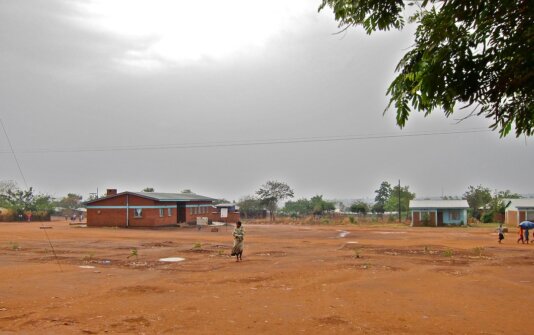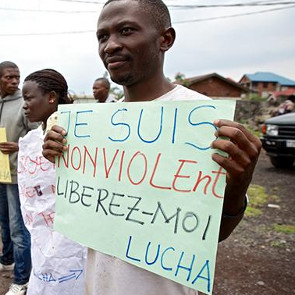- About
- Topics
- Story
- In-Depth
- Picks
- Opinion
- News
- Donate
- Signup for our newsletterOur Editors' Best Picks.Send
Read, Debate: Engage.
| August 03, 2022 | |
|---|---|
| topic: | Refugees and Asylum |
| tags: | #Malawi, #Democratic Republic of Congo, #refugees, #Rwanda, #M23 |
| located: | Democratic Republic of the Congo, Malawi, Rwanda |
| by: | Robert Bociaga |
At least 15 people have been killed during the recent anti-United Nations protests in Goma, the capital of DRC's North Kivu province. UN Secretary-General Antonio Guterres suggested the attacks may have amounted to "war crimes."
Crowds protested against the United Nations Organization Stabilization Mission in the Democratic Republic of the Congo (MONUSCO), claiming that the mission has failed to put an end to decades-long fighting between armed groups in the country.
MONUSCO is one of the largest peacekeeping operations in the world. However, it has frequently faced criticism in the turbulent eastern provinces, where many claim it has not done enough to put a stop to years of bloodshed.
The unstable area, where mass killings of civilians are frequent and conflict has driven millions of people from their homes, presently contains more than 120 armed factions.
"It’s been over 20 years since the UN peacekeepers have been working there and do not help them," said Willy D., a 30-year-old refugee living in Dzaleka, Malawi. "Now the rebels take advantage as the insecurity continues, so where are we going to be repatriated?
"People don’t feel any peace. Every day people are dying. And why? That’s a big challenge and we need to question ourselves."
According to the UN, demonstrators "violently stole weapons" from Congolese police officers and fired at peacekeeping personnel. They claim that people had also been robbing and vandalising installations, breaking into bases and hurling stones and petrol bombs.
During the turmoil, hundreds of protesters stormed the MONUSCO headquarters and a supply depot in Goma while blocking highways and shouting insults at UN personnel.
While security personnel used tear gas and helicopters to evacuate staff members out of the buildings, protesters broke windows and stole valuables, the reports claim.
The protests took place after M23, an armed group that had been largely dormant for years, renewed attacks on civilians.
Since then, rebels have made considerable gains in eastern Congo, taking control of towns like Bunagana near the Ugandan border in North Kivu.
According to the UN Refugee Agency (UNHCR), millions of people have been displaced by violence in recent years, with 97 civilians killed just last month in attacks across eastern DRC that included kidnappings, looting and home fires.
Following an increase in activity by the vicious M23 rebel group in North Kivu, several communities of internally displaced families have been targeted and more than 160,000 additional people have been forced to flee their homes.
Looking in the direction of his country of origin, Jean Marie D., a 40-year-old barber who fled to Malawi four years ago, does not regret his decision. "At times, we are afraid of Malawians, but after all this is a peaceful country. Poor, but peaceful," he told FairPlanet.
"We Congolese, too, are peaceful people. The guns are not carried by us," he adds, suggesting that Rwandans constitute the rebels. "They want to take over our minerals."
Although there is no way to ascertain whether Rwanda is supporting M23, experts believe it is quite possible given the group's weaponry, which the UN says includes long-range weapons.
M23, named after a failed peace agreement signed on 23 March, 2009, is descended from a line of Congolese rebel groups that dates back to the 1990s, when regional conflicts in the DRC were brought on by the genocide that occurred in neighboring Rwanda and spilled over the border.
In 2012, the group orchestrated the last significant uprising in the east. Before government forces and UN peacekeepers drove its fighters into Rwanda and Uganda, both of which were charged with aiding the rebels, it had taken control of parts of North Kivu, including Goma.
Approximately 1,200 miles away from the troublesome Kivu Province, Congolese refugees try to make ends meet at Dzaleka camp in Malawi. There, they search for job opportunities, pursue education and hope to be relocated abroad. They arrived here looking for a temporary safe shelter, but most stayed for many years and, in some cases, decades.
Against the backdrop of ongoing insecurity, the number of refugees at Dzaleka has been rising over the years, while "the food ratios [get] tinier and tinier," they say.
Alarmingly, as the World Food Program faces shortages in funding and is over-extended trying to deal with other emergencies, hundreds of people at Dzaleka no longer qualify for food aid. Many disagree with the choice, which they claim could bring about acute distress and prolonged hunger among camp dwellers.
Furthermore, given the rising congestion, international crimes have been rampant at the camp. Recently, numerous forms of human trafficking have been identified, and, according to the authorities, children were trafficked both inside and outside the camp for domestic and agricultural labour.
Women and girls are reportedly still sexually exploited at Dzaleka and elsewhere in Malawi, and, in some cases, fall prey to sex trafficking schemes that land them in other Southern African countries.
US Secretary of State Antony Blinken plans to travel to Rwanda and the DRC early next month in an effort to defuse increasing tensions between the two countries, media reports stated.
Elections, the M23 uprising and mining contracts are all on the agenda.
However, some are skeptical that Blinken's visit will result in a lasting peace agreement given the convoluted and prolonged nature of the conflict.
Many human rights groups fear that that Rwanda has enjoyed impunity for too long under the protection of the United States. The Kagame regime has put dissidents behind bars, actions which the US government protested; nevertheless, the latter continued to turn a blind eye on human rights violations in the country.
That said, for many Congolese refugees, there’s still a light at the end of the tunnel, and a solution must be political, they say. "We hope that, one day, our country will be great," said Jean Marie, "The refugee problem must end."
Image by MONUSCO/Sylvain Liechti.
By copying the embed code below, you agree to adhere to our republishing guidelines.


